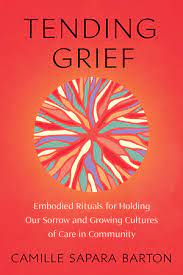Tending Grief
0,00 €
| Language of origin | |
|---|---|
| Publication date | |
| Infos : | Page Count: 272 |
Embodied Rituals for Holding Our Sorrow and Growing Cultures of Care in Community
An embodied guide to being with grief individually and in community—practical exercises, decolonized rituals, and Earth-based medicines for healing and processing loss
We live in a culture that suppresses our ability to truly feel our grief—deeply, safely, and on our own terms. But each person’s experience is as unique as the grief itself. Here, Camille Sapara Barton’s take on grief speaks directly to the ways that BIPOC and queer readers disproportionately experience unique constellations of loss.
Deeply practical and easy to use in times of confusion, trauma, and pain, Tending Grief includes rituals, reflection prompts, and exercises that help us process and metabolize our grief—without bypassing or pushing aside what comes to the fore. Sapara Barton includes exercises that can be done both alone and in community, including:
• Altar practices to honor and connect with ancestors known and unknown
• Locating, holding, and dancing your grief
• Sharing circles for processing communal loss
• Water, fire, and nature‐based rituals
• Honoring the survival utility of numbness—and knowing when it’s time to release it
• Peer support and integration
• Herbal medicines and plant‐based healing
Sapara Barton honors each and every experience: The loss of displacement from homelands, from severed lineages and ancestral ways of knowing. The grief of colonization and theft. The deep heaviness that burrows into our bodies when society tells us our bodies are wrong. Practical tools and rituals help readers feel into their grief, honor what comes up, and move forward in healing.
Written specifically to center and hold the grief of BIPOC readers, Tending Grief is an invitation to reconnect to what we’ve lost, to find community in our grief, and to tend to our own suffering for our individual and collective wellbeing.
GRIEF TOOLS FOR BIPOC READERS: Resources for an underserved market whose experiences of grief are compounded by marginalization or ancestral disconnection and bound up in cultural experiences that most grief literature misses.
NEEDED BOOK ON A TIMELY TOPIC: Explores grief beyond the personal into community and societal expressions / experiences of loss. With racism, anti‐trans and queer violence, climate change, displacement, gun violence, and systemic oppression top of mind, readers need up‐to‐date and culturally competent grief tools now more than ever.
PRACTICAL AND ACCESSIBLE: Adapted from the author’s grief toolkit and written with a grieving audience in mind, information is presented in an approachable and easy‐to‐digest format.
EARTH-BASED AND HERBAL MEDICINES: The final chapters include a brief section on plant‐based medicines for grief as well as a research section with books, teachers, and organizations for further learning.
INDIVIDUAL AND COLLECTIVE HEALING: Offers tools for personal healing and processing grief and pain in community.
HEALING FOR ACTIVISM: Shows how metabolizing and embodying our grief can empower us to be more effective activists and show up for our commu‐
nities and the planet.




